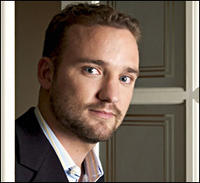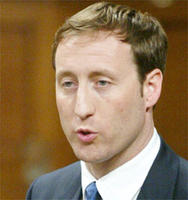
Apologies for the delay on this, but it's been a crazy week. So the Israeli Consul-General to Canada (Toronto and Western Canada),
Ya'acov Brosh, came to speak on Monday night and I was going to be moderating the Q and A session afterwards. We knew it was going to be provocative and emotional, and the event certainly lived up to its hype.
So Mr Brosh made his speech, speaking about Israel after its disengagement from the Gaza Strip. As lectures go, it wasn't really that inflammatory. He made some remarks (that I felt were unjustified) that Israel was the only true democracy in the Middle East, but he didn't say anything demeaning really towards Muslims as a group - he was pretty tempered. This is coming from a guy who has argued that "all Muslims are not terrorists, but most terrorists are Muslim". He spoke about Israel as a haven for high-tech industry, as a multicultural nation, etc. In all, I guess his lecture was about 30 minutes long - then a girl from Quebec and I went up to the front to moderate and facilitate the Q and A session.
I tell you that moderating that meeting on Monday night was quite possibly the most difficult thing I have ever done in my entire life.
We went with a speaker's list format, writing names down on a piece of paper and going to their questions one by one to keep some semblance of order. Firstly, an Afghani student asked a question, very respectfully, both to Mr Brosh and to the system we were using. Next was a guy from Palestine, who used to be my roommate. Again, he asked a really good question. But Mr Brosh responded to all questions in a really condescending, insulting manner. He would ask for your name so he could respond to you by name, but then insult your intelligence. He didn't deal with the principle behind your point, but he would find a semantic flaw and discuss that instead. He demanded that his questioners tell him their sources, and read him back the exact facts and sentences. He made many arguments without backing them up, such as arguing that the massacre at the Jenin refugee camp never occurred. And I think he was really very disrespectful to our Arab Muslim students as well as anyone who asked a question in general.
So this is what I was dealing with. After Mr Brosh responded to the Palestinian student's question in such a manner, the student tried to follow-up, and rightly so. But I had to cut him off. To allow one follow-up would open the doors to many, many more follow-up questions, turning it into a debate that could go on forever, really, rather than a Q and A. Plus, we had a lengthy speaker's list still waiting. So I told him to sit down. An Iraqi student and one from Holland were sitting next to him, and told him to keep speaking, even though I had said otherwise. So I repeated myself, asking the Palestinian if he would please sit down, we had a long speaker's order to get through. Thankfully, he sat down and did as I said. So that was one crisis averted, I suppose. Unfortunately, after this, he left the auditorium.
Mr Brosh also had this tendency of cutting questioners off in the middle of their questions, challenging premises and sources. I admit that we made a mistake here - we should have asked him earlier in the session to let people ask their questions in full. I was in a difficult position, though, because he was our guest, and I wasn't sure how appropriate it would be to cut him off. Eventually, later in the night, we began to do so, but we should have done this earlier.
Someone (I don't remember who) asked a question before the Iraqi student, and it started to degenerate into follow-ups. I began to cut them off, but our resident citizen of Baghdad looked furiously at me. I don't think I've ever seen him as angry as that night. I put that aside, though, and kept repeating myself and asking this person to stop asking their questions. Eventually, they did. Note that this is compounded by others in the audience demanding that this person be allowed to ask more follow-ups.
Eventually, it got to the Iraqi student, and his questioning turned into an angry exchange back and forth between Mr Brosh. Mr Brosh was encouraging it, as well, which didn't help. This was dicey - I kept asking the student to get to a point, to a question, which eventually he did. After his question, though, he and essentially the rest of the Arab students got up and left.
The last question that I remember was from a Norweigan student, who spent her summer service volunteering with a service organization in Palestine. She was very frustrated through the whole meeting and was pleased to be able to ask her question, which was about Israeli violation of UN resolutions. She had a copy of the resolutions in question, published by the Israeli Ministry of Foreign Affairs, and as she asked her questions, she stepped closer and closer to the podium (which had me a little tense), finally tossing the resolution onto the podium and telling him to do the source analysis. Yikes. Again, more follow-ups that I eventually cut off.
So we finally decided to end the meeting, after looks to one of the organizers, who came down to the front and did the brute work of ending the whole thing for us. After it finished, Mr Brosh handed me the two books that Israel had given to our library, and I was absolutely exhausted. Mr Brosh went off with his RCMP security detail. It was quite a night, and very frustrating for me. I had agreed 100% with what they were saying, but I needed to keep things rolling. It was my job. The Palestinian student told me that I hadn't let him defend his country - ouch.
On Tuesday night, we had a presentation from the other perspective, the Palestinian perspective. Very worthwhile. I was so impressed by the students from Israel and the Middle East - I think that there is hope for peace. One of the Israeli students made a speech more powerful than any other I have ever heard. It was infused with more emotion, character and passion than anything else. He spoke about his need to serve in the military, but how he would not be happy about it. He told us about his powerful desire for peace, and how his urge to build that peace was one of his key reasons for applying to my school, which focusses its education on international understanding and peacebuilding. After he spoke and the Palestinian student responded,
I was reminded of how privileged I was to be there. And I'm even more committed now than before that peace, as represented in the Japanese calligraphy above, is possible.
 I just had the privilege of spending a week in beautiful San Francisco, California, one of the best cities I've ever visited. I'm pretty picky when it comes to travel, so you can take my gushing here to mean something pretty significant. Sure, it took my over 27 hours to get there and 20 hours to get back, but it was certainly worth it. SF is, for the most part, supremely clean and very safe, and it feels very alive - the city pulses beneath your feet.
I just had the privilege of spending a week in beautiful San Francisco, California, one of the best cities I've ever visited. I'm pretty picky when it comes to travel, so you can take my gushing here to mean something pretty significant. Sure, it took my over 27 hours to get there and 20 hours to get back, but it was certainly worth it. SF is, for the most part, supremely clean and very safe, and it feels very alive - the city pulses beneath your feet. 








